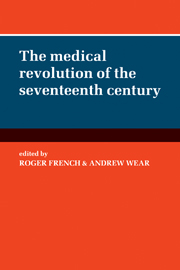Book contents
- Frontmatter
- Contents
- List of contributors
- Acknowledgements
- Introduction
- 1 Medicine, religion and the puritan revolution
- 2 Harvey in Holland: circulation and the Calvinists
- 3 The matter of souls: medical theory and theology in seventeenth-century England
- 4 Mental illness, magical medicine and the Devil in northern England, 1650–1700
- 5 Passions and the ghost in the machine: or what not to ask about science in seventeenth- and eighteenth-century Germany
- 6 Thomas Sydenham: epidemics, experiment and the ‘Good Old Cause’
- 7 The medico-religious universe of an early eighteenth-century Parisian doctor: the case of Philippe Hecquet
- 8 Isaac Newton, George Cheyne and the Principia Medicinae
- 9 Physicians and the new philosophy: Henry Stubbe and the virtuosi-physicians
- 10 The early Royal Society and the spread of medical knowledge
- 11 Medical practice in late seventeenth-and early eighteenth-century England: continuity and union
- Index
5 - Passions and the ghost in the machine: or what not to ask about science in seventeenth- and eighteenth-century Germany
Published online by Cambridge University Press: 05 January 2012
- Frontmatter
- Contents
- List of contributors
- Acknowledgements
- Introduction
- 1 Medicine, religion and the puritan revolution
- 2 Harvey in Holland: circulation and the Calvinists
- 3 The matter of souls: medical theory and theology in seventeenth-century England
- 4 Mental illness, magical medicine and the Devil in northern England, 1650–1700
- 5 Passions and the ghost in the machine: or what not to ask about science in seventeenth- and eighteenth-century Germany
- 6 Thomas Sydenham: epidemics, experiment and the ‘Good Old Cause’
- 7 The medico-religious universe of an early eighteenth-century Parisian doctor: the case of Philippe Hecquet
- 8 Isaac Newton, George Cheyne and the Principia Medicinae
- 9 Physicians and the new philosophy: Henry Stubbe and the virtuosi-physicians
- 10 The early Royal Society and the spread of medical knowledge
- 11 Medical practice in late seventeenth-and early eighteenth-century England: continuity and union
- Index
Summary
INTRODUCTION
What not to ask about science as it lies in the cradle of the ‘scientific revolution’ and in its early childhood, the age of enlightenment, is what ideas it supressed. To concentrate on this question would be to risk simplification in the complexity of the philosophy and natural science that was emerging in the seventeenth century. Ideas construct reality and their successful support by the important men of a period exercises pressure on other methods of perceiving the truth. Although little of what was believed to be scientific in the past would be reconcilable to our own construction of scientific reality, the claim of ‘science’ to ‘truth’ became firmly established by the eighteenth century. That science became equivalent to truth in a world which was primarily religiously oriented was a major shift in the Weltanschauung of an age and much more important than the ‘decline of magic’. In this sense, and indeed more so where science began to define human nature, it is justifiable first to ask who paid the price in political and cultural terms, and secondly to enquire whether science did in fact help to dislocate fundamental perceptions in its seemingly victorious advance.
Science in the seventeenth century has received much attention. Its opposite, ‘superstition’, has, like the ‘decline of magic’, more than equally found its historians. This convenient dichotomy, however, supports a two-class system in which only science is linked with the advancement of learning.
- Type
- Chapter
- Information
- The Medical Revolution of the Seventeenth Century , pp. 145 - 163Publisher: Cambridge University PressPrint publication year: 1989
- 2
- Cited by



